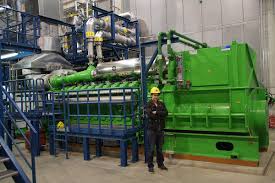Natural gas and gasoline engines are used in vehicles, heavy-duty equipment, and appliances. Companies with fleets of cars or trucks and other types of equipment can keep their gasoline and natural gas engines fueled with the help of remote fueling services. These fueling companies also offer gasoline and natural gas engine oil services to keep machinery running efficiently. Here are some of the differences and similarities between gasoline and natural gas engines:
Gasoline Engines
Gasoline is created by refining crude oil found in underground rock formations. This oil is made up of carbon compounds from pre-historic plant and animal remains. Once the oil has been refined, the gasoline is combined with ethanol to increase the octane of the end product. The higher the octane, the higher the performance and efficiency of the fuel. Gasoline has a lower octane level than natural gas but is still an efficient fuel source. Four-stroke gasoline engines are found in many passenger vehicles, light trucks, and smaller pieces of equipment. A four-stroke engine has four processes that result in usable energy: intake, compression, combustion, and exhaust. Adequate levels of oil help maintain the efficiency of these processes.
Engine oil for gasoline engines should have a low viscosity. Synthetic and synthetic blend oils have the ideal viscosity and heat range for gasoline engines. A high-viscosity oil takes longer to heat up and pump through the gasoline-powered engine, causing friction and heat that could damage engine components. Natural gas engines require low-ash or ashless oil. These types of natural gas engine oil help remove debris from the engine and move it into the oil filter. This keeps the engine operating more efficiently over time. Fuel delivery services can provide customers with lubricants for a variety of engine types and applications. Scheduling regular oil delivery helps extend the life of your equipment and vehicles.
Natural Gas Engines
Natural gas is sourced from underground wells and rock formations around the world. It is an odorless, colorless gas that can be processed into two forms: compressed and liquefied. Compressed natural gas can be used in light-to-heavy-duty equipment and industrial applications. Liquefied natural gas may have a higher energy capacity than the compressed form, providing vehicles with gas mileage comparable to gasoline engines. Natural gas is a highly efficient fuel source, making natural gas engines a suitable choice for budget-conscious fleet and equipment owners.
Some natural gas engines are bi-fuel, meaning they can use gasoline and natural gas or diesel and natural gas. The fuel systems are separated to prevent mixing the fuels within the engine. Two fuel sources allow equipment operators to choose the most efficient fuel type for the jobs they are completing. For vehicle fleets, dual fuel engines offer more flexibility and range, reducing the number of stops and allowing drivers to stop in gasoline fueling stations if there are no natural gas pumps nearby.
Engine Similarities
Natural gas and gasoline engines are both powered by internal combustion. Vehicles with these engines store fuel in tanks near the vehicle’s rear. The fuel is carried toward the engine’s fuel-injection system through pressurized fuel lines. Once the fuel is injected into the combustion chamber, it is mixed with air and compressed. The compressed fuel and air mixture is then ignited by the spark plugs and turned into accessible energy that powers the engine.
Some gasoline engines can be converted to compressed natural gas engines. A gas conversion specialist completes this process by adding a high-strength natural gas cylinder to the underside of the vehicle. Fuel lines are added to connect the tank to the engine’s combustion chamber. The specialist may also install a switch in the vehicle’s cab that enables operators to switch the engine back and forth from gasoline to natural gas.
Find Natural Gas Engine Oil and Fuel
If your company has a fleet of vehicles or regularly operates in remote job sites, oil and fuel delivery services may be beneficial. Fuel-delivery teams provide tanks of natural gas, gasoline, and other fuel types that can be refilled regularly, depending on usage. These teams use remote monitoring and sensors to alert them of low fuel tank levels. Using fuel-delivery services keeps your fleet and job site fueled so your operations can continue uninterrupted. Contact a fuel delivery company today to learn more about gas and oil delivery services.






